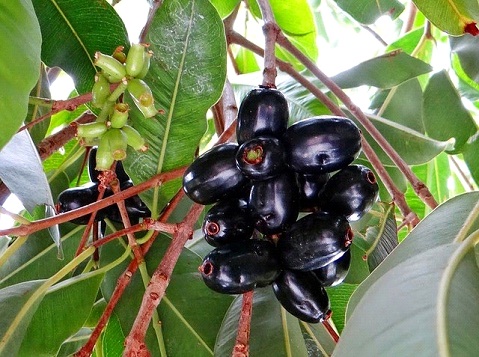
Benefits of Jamun (Jamboo)
Call it Jamun, Jambul, Nerale, Jamboo, Malabar plum or by your favorite name- this fruit tree namely Jamun or Syzygium Cuminiis is another miracle tree. The highly nutritious fruit with very low calories is a snack fruit and is source of various nutrients and is favorite of many. Jamun is a delicious tropical plum-like fruit rich in vitamins and minerals. All parts of the Jamun tree are medicinal. Fruit, seeds, bark, leaves all have their own unique properties making this plant and fruit as one of the important natural medicinal resources.
Do you know? Jamun has very low amount of natural sugar and is diabetic friendly fruit. It contains Jamboline that slows down sugar absorption.
Jamun is referred to as the ‘Fruit of Gods’. The fruit is of significant importance in Hindu mythology.
During his 14-year exile from Ayodhya, Lord Rama is believed to have eaten several berries and plums including jambul. Jamun trees require partial rainfall and thrive in dry weather. Jamun that comes from various parts of the world differ in size, this because of soil and weather conditions.
Health benefit of Jamun:
Bark:
- Bark of Jamun has antihelmintic properties, which help in treating urinary disorders. A glass of Jambul juice with 1/2 teaspoon of bark powder daily is recommended for persons with urinary infections and urinary tract disorders.
- Bark powder mixed with water is effective in curing tapeworm infection.
- Both bark and leaves of jamun are used in combination with other ingredients by Ayurveda practitioners for various treatments such as diarrhea and indigestion. Traditional healers in Asia use seed, leaf and bark powder of Jambul tree is several herbal formulations.
Seeds:
- Seed powder along with turmeric powder is known to cure skin conditions.
- Jamun seed decoction with aromatic herbs is an excellent home remedy to relieve fatigue and strain.
- Seed powder is a cure for digestive disorders and is an excellent home remedy for stomach bloating.
Fruits:
- Pulp is known to be a remedy for chronic cough and asthma.
- Fruits are good for diabetic patients. Fruit juice concentrate made of pulp available in market. Make sure not to add sugar or sugar is not added to fruit concentrate. The jambul fruit is a specific medicine for diabetics due to its effect on the pancreas. Jambul seeds contain a glycoside, namely jamboline which blocks the conversion of starch into sugar in cases of raised glucose levels. In fact all parts of jamun tree, the seeds, fruits and fruit juice all are helpful for diabetic condition – to bring down sugar level.
- Regular consumption of jambul for 2 to 4 months helps individuals with problems of bleeding hemorrhoids significantly.
- Fruit juice with leaf powder is an excellent treatment for ulcerative colitis.
- Jamun juice is excellent for natural bowel movement.
- Fruit is rich in polyphenols and antioxidants. It contains anthocyanin which is known to fight cancer cells. Individuals that undergo chemotherapy or radiation sessions benefit significantly from jamun juice consumption. Anthocyanins, flavonoids, ellagic acid and gallic acid present in jambul have the capacity to prevent carcinogenesis in organs.
- Pulp of jambul is used as a treatment for gingivitis (bleeding gums).
- Regular intake of jambul stimulates healthy liver function.
- Fruits also reduce excessive salivation.
- The jambul fruits are helpful in healing wounds.
Leaves:
According to Ayurveda the leaves of the jambul tree can help to overcome the female infertility due to endometrium lining or ovarian functional disorder. An effective remedy is an infusion of the fresh leaves of jambul fruit with butter-milk or honey. The leaves of the jambul stimulate the progesterone hormone secretion and help in absorption of vitamin E.
Culinary uses:
Ripe Jamun fruit can be used in a number of healthy snacks and dessert recipes.
Jamun jam, jamun juice, jamun pie (similar to blueberry pie), pudding, custards, candy, yogurt, Indian sweet -Halwa- all are delicious. Jambul sauce adds a unique flavor to frozen desserts. You can top cakes, pastries, puddings, and custards with a mushy dollop of jambul pulp.
References:
- Image credit: Image by Bishnu Sarangi from Pixabay (Free to use under Pixaby content license. Published on Aug 16, 2013)
- http://www.indianmedicinalplants.info/
- http://www.odishafdc.com/
Author: Sumana Rao | Posted on: January 15, 2026






















2 Comments on “Benefits of Jamun (Jamboo)”
The news very nice,Thanks
Thank you! Please keep visiting the site.
Write a comment